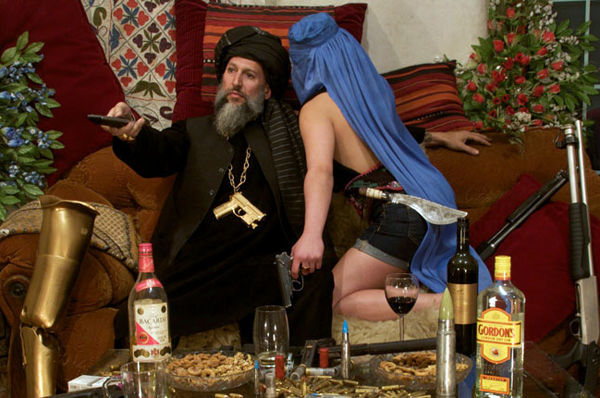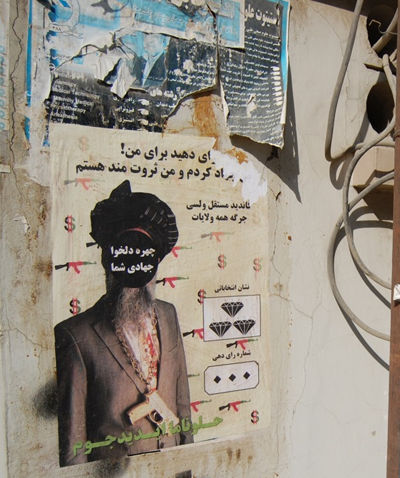Dion Nissenbaum, Checkpoint Kabul Blog

(Aman Mojadidi as the Jihadi Gangster, his latest artistic incarnation.)
More photos: http://www.revolve-magazine.com/artist-profile.php
Last year, Kabul-based artist Aman Mojadidi transformed himself into an Afghan policeman and set up a fake checkpoint where he searched cars and then offered drivers $2, along with an apology for any bribes they had been forced to pay to policemen in the past.
This fall, Mojadidi's latest incarnation, the Jihadi Gangster took his bling, his gold-plated guns, and his bravado on the campaign trail to run for parliament.
While the Jihadi Gangster (shouldn't it really be Jihadi Gangsta?) didn't round up the necessary signatures or submit the proper paperwork to run as a legitimate candidate in the recent election, he did go so far as to produce campaign posters that were stuck up on walls around town.
In the final weeks of the campaign season, Jihadi Gangster campaign posters began popping up alongside posters for legitimate politicians.

In the final weeks of the campaign season, Jihadi Gangster campaign posters began popping up alongside posters for legitimate politicians.
The JG's campaign slogan, emblazoned on the poster, is simple: Vote for me. I've done jihad. And I'm rich.
JG's face is blacked out by a box and the words: Your favorite jihadi face here. JG is wearing a black turban, suit and a gold plated handgun hanging around his neck from a large gold plated chain.
The backdrop is filled with dollar signs and AK-47s.
Because of the high illiteracy rate in Afghanistan, each candidate in an election has a small icon next to their name and face so voters can more easily identify their favorite politicians.
Sometimes it is cups or horseshoes. Other times it is a fish or key. The Jihadi Gangster's icon: Three diamonds.
Amid growing indications that power brokers engaged in widespread fraud in last Saturday's election, some might argue that the next parliament is likely to be filled with plenty of criminal minds, even if the Jihadi Gangster won't be joining them.
As things go in Kabul, the JG's upstart campaign almost never got off the ground. At least one printer refused to print the JG campaign posters because he said they were too inflammatory and insulting.
Since the JG won't be heading to parliament any time soon, he is set to make his true international debut.
Next month, Mojadidi's work, which you can see more of here and here, will be featured in Paris at the Gallery Nikki Diana Marquardt from Oct. 23 to Oct. 31.
In some ways, the JG is a manifestation of the two worlds Mojadidi inhabits as a native of Jacksonville, Florida with deep political roots in Afghanistan. (His uncle is Sibghatullah Mojaddedi, the former president who now leads Afghanistan's upper house of parliament.)

RAWA: Many warlords and worse human rights violators were candidates for the election. This photo shows an election poster of Abdul-Rab Rasul Sayyaf in Kabul. Afghans express their anger to criminal candidates by throwing red color on their election posters. (Photo: RAWA)
More photos
In a recent interview, the journalist asked Mojadidi if he considered himself Afghan or American.
"Afghan-American became the ‘nom du jour’ and so I was that for a while," he said. "But in the U.S., most Americans identify me on sight as a foreigner, and here in Afghanistan most Afghans identify me as a foreigner on sight as well. I was born in the U.S., my parents are Afghan, and I’m fluent in both English and Dari; it could end there. But I’ve started to think more about how one’s identity has become almost taken out of one’s own control, and is more and more defined by others. So I think about post-identity possibilities. In answer to your question using the options you’ve given me, I guess that would mean ‘neither.’ But beyond that I’m not sure."
Mojadidi said his life and art have largely been defined by the conflict in Afghanistan.
"For me, living with my own internal conflicts, be they issues of religion, identity, relationships, coupled with the global conflicts carried in the media, and tripled with living in a conflict zone has created a strange nexus where no conflict feels distant or separate from the reality within which I live," he said. "It all seems connected somehow, as if a state of conflict is simply what must be accepted; many of which are not conflicts that can or will be resolved but that just make up a part of the personal and global identity. At a certain point it becomes less that I feel as though as I’m in or at conflict with anything, but rather that I am conflict, as a state of being."



